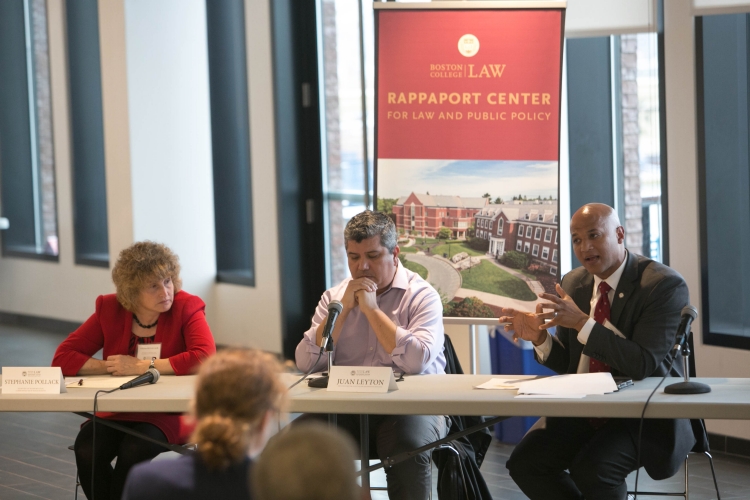
By
A crossroads of Boston’s Roxbury neighborhood, Dudley Square is one of the busiest transit hubs in the state, Massachusetts Secretary of Transportation Stephanie Pollack said at a September 30 forum held by Boston College Law School’s Rappaport Center for Law and Public Policy.
“There are 16,000 people who pass through Dudley Square on MBTA bus lines daily,” Pollack told an audience gathered in the newly renovated Bolling Municipal Building in the heart of the square. “It is the eighth largest hub in the entire MBTA system.”
Bus transit in the neighborhood will play a critical role in the public and private development now finding its way to the neighborhood, which is home to 36,000 residents but suffers from an unemployment rate of 17 percent – roughly four times the statewide average, according to neighborhood advocates and city officials.
The panel discussion, one of a series of programs offered by the Rappaport Center this semester, included Boston’s Chief of Economic Development John Barros, Dudley Street Neighborhood Initiative Executive Director Juan Leyton, and Smarter in the City high-tech incubator founder Gilad Rosenzweig. Rachael Rollins, former chief legal counsel to Massport, MassDOT, and the MBTA, moderated the discussion.
The transportation needs of the Dudley Square community, state and city transportation planning initiatives in the area and efforts underway to improve access to Dudley Square in order to attract and retain residents, businesses and non-profit organizations, are crucial issues in the neighborhood, said Rappaport Center Executive Director Elisabeth J. Medvedow.
Panelists discussed the often-contentious history of transportation planning in the neighborhood and the need for state and city agencies, as well as community groups and businesses. They called for a planning partnership to shape transit that better serves residents, yet can support a building boom taking shape along the major routes of Washington Street, Martin Luther King Jr. Boulevard and Melnea Cass Boulevard.
“The decisions around the MBTA should be made with all of us who use the MBTA,” said Barros, a longtime neighborhood leader on issues surrounding housing, transportation and economic development. “State government, the city, the T and state transportation should all be working cooperatively.”
But a history of poor cooperation leaves many residents skeptical about the input they may have in planning for the future, said Leyton, who leads the venerable DSNI. Barros said the 1987 demolition of the old Washington Street Elevated rail line – which ran right through the square - was supposed to be replaced with an “equivalent service” many residents feel never materialized.
“There is a historical memory that has to do with being marginalized,” said Leyton. “It may not have anything to do with some of us here, but it needs to be addressed.”
Pollack said transit planning has to navigate a broad group of stakeholders: cities that own the streets and sidewalks, the T – which provides the vehicles and drivers – bus riders, motorists and area businesses, to name a few.
She said dedicated “bus rapid transit,” or BRT, routes like the T’s Silver Line – which runs between Dudley Square and downtown Boston – should be able to provide better service to riders. Yet she acknowledged there is currently no funding in the MBTA budget to make customer-friendly fixes like four-season enclosures or pre-paid boarding.
She said the riders who pass through Dudley Square’s transit hub could benefit from those types of changes. But cooperative planning is key.
“We have two work better together,” said Pollack. Barros said Dudley Square is undergoing a building boom, but will need better transit in order to attract future development and help connect residents with jobs in Roxbury or neighborhoods like the Longwood Medical Area, where he said each day 700 jobs go unfilled.
The city’s $115-million investment in the redevelopment of the Bolling Municipal Building, formerly the Ferdinand Building, is being followed by private development projects that now stand at $200 million in value, he said.
“Transit-oriented development is something we don’t do enough of,” said Barros. “We need to do more around transit hubs like Dudley because we’ve seen what follows.”
Rozensweig, a member of the Rappaport Center's advisory board, said he launched his start-up incubator to transplant part of the state’s high-tech economy into a neighborhood in need of business growth. He said others will follow.
“I am very happy to be here in Dudley Square with the business I’m running and many more businesses will come here because of this building and the growth that is taking place,” he said.



